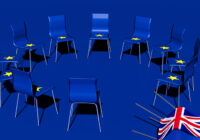The relentless political logic of Brexit will soon lead a determined group of Conservative MPs to stop Brexit in its tracks.
There is a relentless logic about the whole Brexit saga. Like a series of deductions in a mathematical proof, one step leads to another until a firm conclusion is reached. The reasoning process can be lengthy and complicated, and sometimes the outcome can be surprising. So it will be with Brexit.
To the immense frustration of Brexiteer politicians who believed they could break apart the four fundamental freedoms of the European Union in goods, services, capital and labor in order to secure a bespoke “deep and special partnership” based on extensive cherry-picking, the EU is holding firm. It just won’t play ball. Instead, it continues very politely to force Britain to choose between a Brexit in which we stay locked into the whole European economic system of the customs union and the single market and jumping off an economic cliff.
It’s a miserable choice for Britain. Either we have a Brexit in which the only thing we’ve achieved in the name of “Take Back Control” is to give up our seats on the European Council and in the European Parliament, thereby becoming a vassal state of the EU, or we leave the EU in March 2019 without a deal, wreck our economy and inflict grievous harm in every corner of the realm.
The bipolar choice we face should be becoming brutally clear to all but the most ostrich-like of MPs in Parliament. Even the slow learners amongst them will have worked it out in the next few months. The interesting question is how they will react when this choice can no longer be evaded.
Some will undoubtedly want to head for the cliff and take the plunge, dreaming of liberation and freedom after the fall. We know who they are. Some are ideologically-driven right-wingers dreaming of a brave new world free of annoying EU rules and regulations. Some are traditional far-left socialists wishing to ensure that they can take control of the means of production, distribution and exchange unhindered by the tedious single market enforcement mechanisms of the EU. Others simply don’t like living with a Polish family next door, or at least worry that many of their constituents don’t. These odd bedfellows have been dominating the political agenda in the last few years, but this might soon change.
KICKING THE CAN
If you were to ask the vast majority of MPs which choice they would take — the cliff edge or the full European package with which we have lived for nearly half a century — many would initially wriggle and squirm. They would still try rather pathetically to grab a piece of European cake that they could greedily devour. But if you were to force them to choose between the two options, they would choose the European package. Some would do so happily, most rather grumpily, but that is what they would choose.
So how does the majority of MPs rejecting the cliff and therefore by default supporting the European package impose its will on the others? The cliff-jumpers are a powerful faction within the Conservative Party, but even there they are probably not the majority. The current pro-Brexit Labour leadership is already in a weak political position given the overwhelming pro-remain sentiment in both the party and its electoral base, but jumping might still be seen as the more appealing option by a small number of Labour MPs. We can therefore be pretty certain that both major parties will stay deeply divided.
And so the metaphorical can continues to be kicked down the road while the literal clock continues relentlessly to tick. A delay here, a fudge there. It’s becoming quite an art form in the last few years in Brexit Britain. The most talented practitioner is the prime minister, but Theresa May is certainly not alone in developing this particular skill set. The so-called Chequers deal was really just another example of can-kicking, because even its authors knew that the EU would never accept it. Another recent manifestation is a “blind Brexit”, whereby the UK enters a surreal “transition period” for nearly two years or perhaps longer as a powerless vassal state of the EU, still safely embedded inside the single market and the customs union. During this time we would not have even the foggiest notion of what might come next.
Political logic dictates it will be the pro-European Conservatives who will finally bring things to a head. When the choice can no longer be evaded, they will urge the prime minister to finally turn her back on the hard-line Brexiteers and accept the European package on offer by the EU in order to avoid the cliff. If she needs more time to negotiate the details, they will urge her to seek a lengthy extension to the Article 50 deadline in order to do so. If she agrees, she will inevitably have to see off a challenge from the committed cliff-jumpers in her party. She might or might not win the resulting vote of no confidence, but either way the Conservative Party will effectively split.
With or without the current prime minister, the pro-European faction within the Conservative Party will then be forced to rely on the support of Labour MPs to win key votes in the House of Commons. These MPs will extract a high price for their support, but they will not refuse. By the time this happens, the stakes will be too high and the time still available to stop the clock too short.
There will no doubt be vocal calls for yet another general election, especially from the Labour leadership, but the last thing the Conservative pro-Europeans will do is support a simple vote of no confidence in Parliament, which might result in Jeremy Corbyn entering Downing Street as prime minister. As a group, they are far too clever for that. The next general election isn’t scheduled until 2022, long after the key Brexit decisions will have been made. Pro-European Conservative MPs will therefore insist that it is the responsibility of those elected in the recent 2017 general election to sort out the enormous mess in which the country finds itself. So Labour MPs will face a brutal choice between accepting an offer of cooperation with an organized Conservative faction in Parliament on an agreed and negotiated program, or nothing at all.
STOPPING THE CLOCK
Having possibly tried and failed to persuade Labour MPs to support the program of a minority government led by a Conservative politician, the pro-European Conservative faction will finally be forced to offer Labour and perhaps other parties in Parliament a full coalition government in order to prevent Britain from falling off the cliff. They will present this as a proposal for a “government of national unity” although of course it will be no such thing. It will instead be a government with one central purpose and that is to stop the Brexit clock ticking down to zero at 11pm on March 29, 2019.
Faced with the formal and very public offer of a coalition by the pro-European Conservative faction, Labour MPs will then find themselves faced with a terrible dilemma. If they refuse to support the formation of a new cross-party government of national unity in which they would be the biggest force and, as a direct consequence, Article 50 is neither suspended nor revoked, the Labour Party collectively and each Labour MP individually will be co-responsible for the all the economic consequences of the cliff fall alongside the hard-line Conservative Brexiteers. The vast majority of their voters would never forgive them for this.
So, however reluctantly, they will eventually be forced to accept the offer and enter into formal negotiations leading to the formation of a new government. Even if the Eurosceptic Labour leadership were to decline the offer, there will be a sufficient number of Labour, Liberal Democrat and nationalist MPs absolutely determined to protect their constituents and stop the Brexit clock to make up for the inevitable loss of the hard-line Conservative Brexiteer MPs in crucial Parliamentary votes.
A formal coalition agreement will have to be negotiated, just as was the case before the coalition government was formed between the Liberal Democrats and the Conservatives in 2010. It will include large parts of Labour’s anti-austerity program, watered down by the other elements in the coalition. The negotiations will not be easy, but given the urgency a way will be found. Nobody will get everything they want, but everybody will get something.
Since someone has to do the job, a future prime minister will have to be identified. Even assuming they wanted to participate, the two obvious contenders for the job — Jeremy Corbyn and Theresa May — will both no doubt be ruled out because they would be unable to command sufficiently broad support across the coalition. So a compromise figure will have to be found. Fortunately for Britain, there are a good number of widely-respected and well-known pro-European politicians who could comfortably fulfil this role, certainly on a temporary basis.
Having formed a new government, the coalition prime minister’s first task will be to write to the president of the European Council formally requesting a lengthy extension in the Article 50 deadline in order to allow for further discussions to take place without duress. Following a change of government in Britain, this will be swiftly agreed by the other 27 member states and there will therefore be no need for Britain to attempt to formally revoke Article 50 unilaterally.
The new government will then negotiate a withdrawal agreement, providing for continuing frictionless trade with Europe. This will necessarily incorporate the EU’s minimum demands of continuing full UK membership of the customs union and single market outside the EU. This will satisfy those in the coalition who feel it is important that the British electorate, who voted narrowly in June 2016 to leave the political machinery of the European Union, should have a negotiated option to do so. This withdrawal agreement will then be put to a ratification referendum in which the alternative would be to revoke Article 50 and remain as full voting members.
The funny thing about political logic is that it never stops. As so often with mathematical proofs, it just gets a little harder sometimes to see the deductive steps that lie ahead. So it is here. The national coalition that will be formed to take control of the executive and stop us leaving the European economic system will create its own dynamic. It will face enormous political opposition, certainly from the furious forces of the populist right, but also from the far left. The British first-past-the-post system of elections will therefore coerce the major players in the coalition to stand together when a general election finally arrives, finding a way to field a single national government candidate in every constituency on a common program.
In the electoral meltdown that will then occur, it might look as if anything can happen. But once again, it is political logic that will actually dictate the outcome. But that, as they say, is another story.
The views expressed in this article are the author’s own and do not necessarily reflect Fair Observer’s editorial policy.
Support Fair Observer
We rely on your support for our independence, diversity and quality.
For more than 10 years, Fair Observer has been free, fair and independent. No billionaire owns us, no advertisers control us. We are a reader-supported nonprofit. Unlike many other publications, we keep our content free for readers regardless of where they live or whether they can afford to pay. We have no paywalls and no ads.
In the post-truth era of fake news, echo chambers and filter bubbles, we publish a plurality of perspectives from around the world. Anyone can publish with us, but everyone goes through a rigorous editorial process. So, you get fact-checked, well-reasoned content instead of noise.
We publish 2,500+ voices from 90+ countries. We also conduct education and training programs
on subjects ranging from digital media and journalism to writing and critical thinking. This
doesn’t come cheap. Servers, editors, trainers and web developers cost
money.
Please consider supporting us on a regular basis as a recurring donor or a
sustaining member.
Will you support FO’s journalism?
We rely on your support for our independence, diversity and quality.







